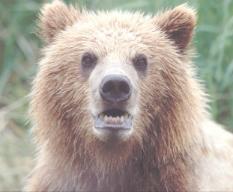
Somewhere in the mist-shrouded rainforests of northern Vancouver Island, a grizzly bear is hibernating in its winter den. And he is the source of mystery, fascination, and even fear among Island residents.
As far as anyone can remember or scientists can determine, only black bears have lived on Vancouver Island.
But this year, grizzlies have been sighted far and wide on northern Vancouver Island and the knot of smaller islands that press close against the coast between Port Hardy and Campbell River.
"This year has definitely been the busiest," Tony Hamilton, large carnivore specialist for the B.C. Ministry of Environment, said in an interview Wednesday.
"The islands are stepping stones, not separated by very much water. It makes sense. If we're going to get grizzlies coming onto Vancouver Island, this is where they'd come through."
Officials suspect three or four sub-adult male grizzlies are responsible for this year's sightings, having paddled and island-hopped their way westward from the B.C. mainland.
A grizzly was photographed at Rugged Point near Kyuquot, on the northwest coast of Vancouver Island in May, close to the time bears emerge from their dens, suggesting it had successfully hibernated on the Island.
That same bear and one or more of the others sighted in the region are likely denning this winter on the Island, too.
A hunting guide spotted another grizzly near Woss later in May, followed by a sighting from a salmon farm east of Port Hardy in June. Later that month, a grizzly was shot dead at Lagoon Cove Marina on East Cracroft Island, north of Sayward.
Grizzlies are a limited-entry hunt in B.C., which means the ones on Vancouver Island are protected. Exceptions are made where the bear represents a real threat to people or property.
The next two sightings, a week apart in July, are thought to be of the same bear: first, on Malcolm Island near Sointula, then at native-owned Cluxewe Resort near Port Hardy. Conservation officers tried unsuccessfully to trap the bear.
"My advice to the ministry is that this is natural, let it happen," said Hamilton, acknowledging some islanders are twitchy about grizzlies in their midst. "There is more sensitivity because people aren't used to it."
Hamilton argues it's unlikely grizzly bears will reach a sustaining population on Vancouver Island because sub-adult males are the ones seeking out distant new territories while the younger females tend to stay closer to the home range of their birth on the mainland.
Among the theories offered for the migration of grizzlies to Vancouver Island are that the grizzly population is expanding and that bleak coastal salmon runs have forced bears to look farther afield for food. "The truth is probably somewhere in between," Hamilton said.
Grizzlies have successfully mated with polar bears in the Arctic, but Hamilton knows of no such mating in the wild with black bears.
In 2002, a female grizzly was sighted with cubs on Hardwick Island, near Vancouver Island. The speculation is one of those cubs was shot in 2003 when it wandered into the native village of Tsulquate near Port Hardy - the first confirmed grizzly sighting on Vancouver Island.
Jeanine Johnny lives in the village and called in that bear to authorities. "They thought I was drunk, stoned," she recalled with a laugh Wednesday. "They told me to get some sleep and that it's just a black bear in its natural habitat."
Johnny used to live with grizzlies in Sparwood in southeast B.C. and isn't looking forward to their continuing presence on Vancouver Island. "It's kind of freaky for me," she said.
In 2006, another grizzly was shot by a man who feared for his granddaughter's safety at Sayward. Hamilton said there were rumours of a grizzly being shot and buried - "a shoot and shovel" - in the 1970s at Sayward, but the report was never confirmed.
Reprinted from the Financial Post.
